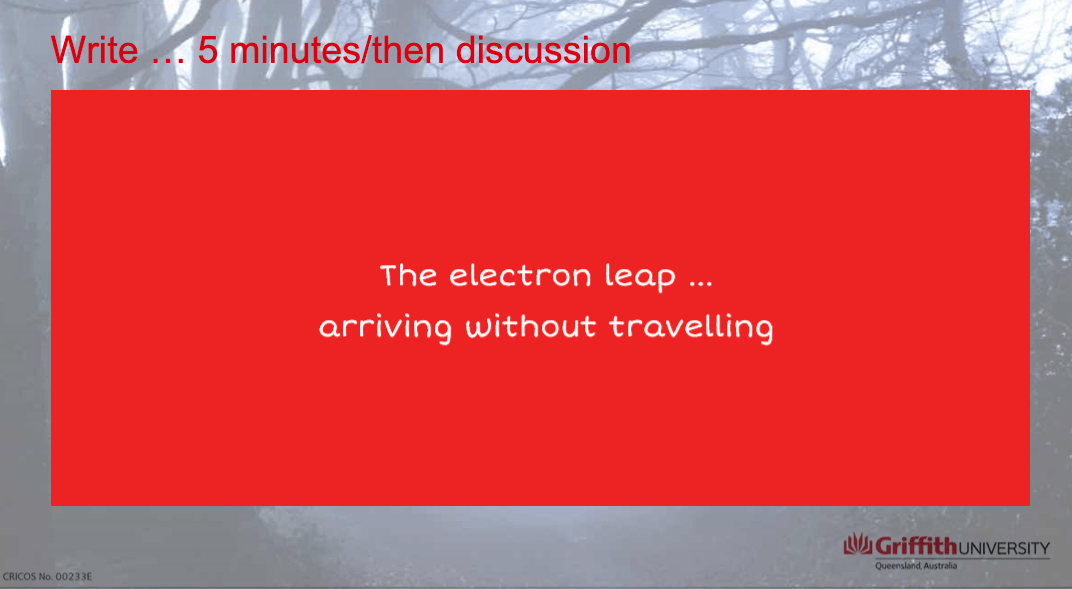It’s Halloween season.
What a perfect time to explore haunting and ghosts!
For our final NM SIG for this year, we are focusing on ghostly matters, and in particular Barad’s (2010) Quantum entanglements and hauntological relations.
Barad explores the disjointedness of time through electron behaviours, the nature of entanglement and the ethics of the Bohr/ Heisenberg Copenhagen meeting during WW2.
An ethics of entanglement entails possibilities and obligations for reworking the material effects of the past and the future. As the quantum eraser experiment shows, it is not the case that the past (a past that is given) can be changed (contrary to what some physicists have said), or that the effects of past actions can be fully mended, but rather that the ‘past’ is always already open to change. (Barad, 2010, p.266)
We are coupling this with the paper of Lisa Blackman (2019) exploring the organizational dynamics of knowledge and scientific truths in a digital age and the hauntological implications inherent in such processes.
To help us work with the haunting nature of our research, bring along a ghostly image or story to contribute to the mix.
What we did in this session
Janis did a wonderful job of preparing and hosting this session.
After our introduction, we did a series of warm up activities:





We then each had time to share our Ghostly Images.
Everyone had something different to share.
Some quick notes during this discussion:
- Locations with histories and personalities, wants and needs, reverberations with bottle trees that ring and chime and send out affective resonances with musical sounds to alert, soothe and repel.
- Hanging in the tree – like words hanging in the air…things unspoken and ghastly or ghostly
- I cannot pass on until I have completed this task
- Humans being so reliant on the visual – with the unseen, the ‘dis’embodied’, the othering is more acute and ‘real’? How can that be…the less concrete it is, the more real the impact?
- We scare ourselves
- We spook ourselves and others
- Haunted by visions and experiences (PTSD), haunted by/in ‘life’
- Haunted\haunting keeps returning to a moment??
- Ghost is morally changed
- Have intention to scare
- Giving them agency to haunt us
Alan Soko – quantum gravity nonsense findings
Salvia Kind – a taxidermist bear in a playground
The Bridge to Terabithia & euphemisms apolitical and no-biological…adults conversations about death with children – so interesting!
socialhaunting.com/song-lines-on-the-road
Geoff Bright and Gabrielle Ivison – Ghost Labs & Social Haunting socialhaunting.com
How NOT to be a mountain biker – My Ghostly Matters
For my contribution, I shared a popular MTB YouTube video which had recently been amended to blur out some content that at the time the video was published in 2013 was published in full, yet more recently has been picked up and challenged in 2021. The section in question explains MTB trail terminology by using a derogatory term for trans people as a joke.
Instead of removing the whole video, the producers chose to blur out the audio and visuals for that section only, leaving an eerie, ghostly trace of what was before. This elision and its haunted digital edited intervention speak to how/why content might/is changed and what is made un/known in the process. Such questions are very in line with Lisa Blackman’s work (see the reading).
For those interested in knowing more, my source comes from the extremely popular video called How To Be A Mountain Biker by IFHT Films. This video has more than 7,194,034 views since being released 24th October 2013.
The ghostly data section is at: (Step 18) 2.25mins – 2.34mins and looks like this:

Here is the current, redacted video in full:
Stretching and Murmuring
This session was really inspiring and thought-provoking. Each participant brought something completely different and I felt my brain being stretched and poked into new and interesting directions.
I came away from this session with much to think about.
Here are some of those murmurs from the Barad reading:
“Our debt to those who are already dead and those not yet born cannot be disentangled from who we are. What if we were to recognise that differentiating is a material act that is not about radical separation, but on the contrary, about making connections and commitments?
An ethics of entanglement entails possibilities and obligations for reworking the material effects of the past and the future.
Ethics is an integral part of the diffraction (ongoing differentiating) patterns of worlding, not a superimposing of human values onto the ontology of the world (as if ‘fact’ and ‘value’ were radically other).
Entanglements are not a name for the interconnectedness of all being as one, but rather specific material relations of the ongoing differentiating of the world. Entanglements are relations of obligation – being bound to the other – enfolded traces of othering. Othering, the constitution of an ‘Other’, entails an indebtedness to the ‘Other’, who is irreducibly and materially bound to, threaded through, the ‘self’ – a diffraction/dispersion of identity.
What if the ghosts were encountered in the flesh, as iterative materialisations, contingent and specific (agential) reconfigurings of spacetimematterings, spectral (re)workings without the presumption of erasure, the ‘past’ repeatedly reconfigured not in the name of setting things right once and for all (what possible calculation could give us that?”
Readings:










